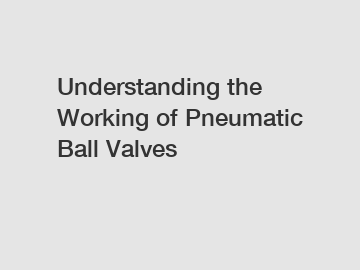Understanding the Working of Pneumatic Ball Valves
Pneumatic ball valves are a vital component in many industrial processes, providing a reliable and efficient way to control the flow of fluids. Understanding how these valves work can help you ensure optimal performance and avoid costly breakdowns. In this blog, we will delve into the working of pneumatic ball valves, explaining the principles behind their operation and highlighting their key benefits.
Pneumatic ball valves are a type of quarter-turn valve that uses a hollow, perforated and pivoting ball to control the flow of fluids through a pipeline. The ball has a hole through the center, which allows the fluid to pass through when the valve is in the open position. When the valve is closed, the ball rotates 90 degrees to block the flow of fluid, providing a tight seal to prevent leaks.
The operation of pneumatic ball valves is controlled by compressed air or gas, which is used to actuate the valve mechanism. When the actuator receives a signal to open or close the valve, it sends a pressurized fluid to the pneumatic actuator, which in turn rotates the ball to the desired position. This process is quick and efficient, allowing for precise control of fluid flow with minimal effort.

One of the key benefits of pneumatic ball valves is their reliability and durability. These valves are designed to withstand high pressures and temperatures, making them suitable for a wide range of industrial applications. Their simple and robust construction also minimizes the risk of leakage or failure, ensuring smooth operation even in harsh conditions.
Another advantage of pneumatic ball valves is their quick response time. The actuation of these valves is fast and precise, allowing for rapid adjustments in fluid flow when needed. This is particularly important in processes that require frequent changes in flow rate or direction, as it helps to improve efficiency and reduce downtime.
Pneumatic ball valves are also highly versatile, with options available for a variety of applications. The size and material of the ball can be customized to suit the specific requirements of the process, ensuring optimal performance and longevity. Additionally, these valves can be easily integrated into automation systems, allowing for remote operation and control.
In conclusion, pneumatic ball valves are an essential component in many industrial processes, providing reliable and efficient control of fluid flow. By understanding how these valves work and their key benefits, you can ensure optimal performance and minimize the risk of breakdowns. With their reliability, durability, quick response time, and versatility, pneumatic ball valves are a valuable asset in any industrial setting.
If you want to learn more, please visit our website China pneumatic actuator for ball valve supplier, China marine cast steel valves, China cast iron din stop check valve manufacturer.

Comments